Restoring UNP image - an uphill task
By Jaliya WIJEYEKOON
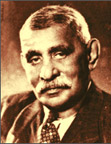 |
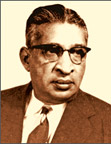 |
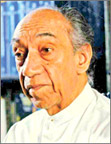 |
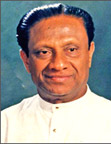 |
| D. S.
Senanayake |
Dudley
Senanayake |
J. R. Jayewardene |
R. Premadasa |
The United National Party has rendered an invaluable service to the
country since its inception in 1946 under a number of leaders, beginning
with its founder leader D. S. Senanayake.
D. S. Senanayake, although not a very educated person or an
intellectual in comparison to his contemporaries, had a great vision for
the future of the country and initiated a number of development
projects, specially to promote agriculture which had been badly
neglected during the colonial rule of over 13 decades.
He had an able rank of lieutenants in his Cabinet to support his
endeavours which he successfully carried out during the short period of
his premiership.
The United National Party took root in all corners of the country
mainly due to the charismatic leadership of D.S. Senanayake, followed by
Dudley Senanayake who was a very soft-hearted, people-friendly Cambridge
scholar who also believed in the development of agriculture to uplift
the living standards of the countrymen.
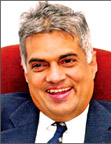 |
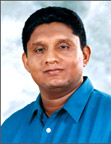 |
| Ranil
Wickremesinghe |
Sajith
Premadasa |
The United National Party rapidly progressed as a formidable
political force though it was not the first political party to be
introduced in Sri Lanka. Under Dudley Senanayake's leadership a large
number of promising young provincial UNP leaders emerged who later
became cabinet ministers and did a great service to the country.
Party stalwarts
Almost all of them were well educated affluent and people of standing
calibre who commanded the respect of the public of the provinces. Most
of them consolidated their positions in the electorates and became
stalwarts of the United National Party. Some of them were defeated at
the subsequent elections held in 1956 and in 1970 but they bounced back
to power at the next election and rendered a yeoman service to their
areas and to the country at large, until they stepped down from politics
voluntarily.
When J. R. Jayewardene became the leader of the United National Party
following the demise of Dudley Senanayake in 1973, he restructured the
party mechanism and effected changes in organisational activities in
keeping with the prevailing political atmosphere of the country. J.R.
Jayewardene was a seasoned, experienced and shrewd politician who was
familiar with the political techniques and tactics of his opponents
picked a large number of new faces from different electorates in the
island and appointed them as electoral organisers.
It was the first time that United National Party appointed some
candidates from ordinary background without considering their financial
stability, professional qualifications or the respect they commanded by
the public in the areas.
What JRJ aspired for was sheer commitment, dedication and the ability
to win the next election with his newcomers since he had already had
earmarked his Cabinet with the able lieutenants who were certain to
enter Parliament at the polls.
J.R. Jayewardene was supported by his trustworthy second rung leaders
such as R. Premadasa, Gamini Dissanayake, Cyril Mathew and Anandatissa
de Alwis.
District leaders
In addition to the newcomers who entered Parliament in 1977 from
different districts, he had senior district leaders such as E.L.
Senanayake from the Kandy district, Bakeer Markar from the Kalutara
district, P. C. Imbulana from the Kegalle district, Aboosally and G. V.
Punchinilame from the Ratnapura district, A. M. S. Adhikari from the
Anuradhapura district, Rupa Karunathilaka from the Galle district, Naina
Marrikkar from the Puttalam district, D. B. Welagadera from the
Kurunegala district and H. G. P. Nelson from the Polonnaruwa district.
Similar district leaders in almost all districts worked hard and
implemented the policies of the Jayewardene regime. All these district
leaders commanded the respect and enlisted the co-operation of newcomers
which resulted in the consolidation of the United National Party's
strength all over the country.
All these dynamic district leaders worked continuously for the
benefit of the public and paid special attention towards the party
supporters in granting employment opportunities in the government
sector.
Party promotional activities were conducted regularly in their
electorates and districts and relevant reports and records were
submitted to the party headquarters. At this time in history, the United
National Party became very strong and the Opposition was virtually
relegated to oblivion in the political arena.
Having completed two terms as the Executive President J.R.J. stepped
down from national politics and Ranasinghe Premadasa took over the
leadership of the United National Party and steered the party towards
victory at the Presidential and subsequent general election. Premadasa
didn't have to toil much to win the election since the party was well
consolidated by that time under JR's Presidency except for some hiccups
with the Indo-Lanka Accord.
However, President Premadasa sidelined some of the most efficient,
powerful and popular figures who had earned the respect and command of
the party to the utter dismay and surprise of the UNP membership. He
gave pride of place to his loyalists who were far behind compared to
those whom he sidelined.
This unwise move of President Premadasa had an adverse effect on the
party mechanism and dark shadows started appearing among the membership.
A political analyst who scrutinised the reasons for the gradual
deterioration of the United National Party during the past 15 years said
that the beginning of the collapse of the party commenced with this
shortsighted and unwise decision of President Premadasa.
Premadasa assassinated
President Premadasa was assassinated in 1993 by an LTTE suicide
bomber and there were dramatic changes in the United National Party
since then. After a series of misfortunes suffered by the UNP, the
leadership was thrust upon Ranil Wickremesinghe in 1994, who was the
Prime Minister for a brief period following the untimely death of
President Premadasa and amply displayed his sheer commitment to
democracy when they lost the Parliamentary elections in 1994 by a single
vote.
Ranil Wickremesinghe became the leader of the opposition when Gamini
Dissanayake was assassinated at the election rally by an LTTE suicide
bomber.
Ranil Wickremesinghe managed to form a UNP government in 2001 with
the support of the dissidents from the Chandrika regime headed by S. B.
Dissanayake who was the general secretary of the SLFP at the time and
senior ministers such as Prof. G. L. Peiris, Bandula Gunewardene and a
few others.
He appointed a cabinet of ministers but certain prominent members
were not given their due place by Ranil Wickremesinghe which resulted in
creating displeasure among them.
Political blunder
Ranil Wickremesinghe's biggest political blunder was the signing of
the infamous ceasefire agreement with Velupillai Prabhakaran even
without the knowledge of his cabinet colleagues which was fully in
favour of the Tigers.
His strategy in solving the issue with the mediation of foreign
nations never paid any dividends but it worsened and the movement was
further strengthened.
Wrong decision
In the meantime, certain measures taken by the Ranil Wickremesinghe's
government to stabilise the economy also did not have the desired
effect.
The Cessation of state sector employment by a government circular
issued by Charitha Ratwatte dealt a severe blow on the job aspirants and
the dissension erupted even among the UNP youth. By this time the JVP
turned aggressive against the government and pressurised Chandrika
Kumarathunga to dissolve Parliament soon after taking over three key
ministries. Ranil's two-year-old government was swept out of power at
the election and since then the UNP cut a sorry figure in the political
arena. The main reason for its debacle was the wrong stand taken by the
party in solving the most vital issue of the day, the eradication of
ruthless terrorism.
Ranil Wickremesinghe grossly over estimated the military strength of
LTTE and never thought that it could be militarily crushed by Sri
Lanka's valiant forces. Some of the UNP top brass members even ridiculed
the efforts taken by the government to vanquish the LTTE leadership
saying that it was militarily impossible.
No helping hand was extended to the Rajapaksa administration even at
the latter stages of the conflict where Prabhakarans dooms day was
virtually written on the wall.
If one were to scrutinise UNP activities while in the Opposition in
the past, it is evident that the former leaders had mainly focused their
attention on consolidating and enhancing the membership while performing
the Opposition leader's duties and obligations in the House with the
consensus of senior members of the party. It is doubtful whether the
present Opposition leader worked in the interest of the party
development in the past so many years.
Unlike the previous party leaders Ranil Wickremesinghe does not have
any innovative or viable program or any particular project which would
attract young people to his fold.
Neither has he any prospective plan for the rural vote base which
could garner majority support. After the humiliating defeat suffered by
the party at the last presidential election and the subsequent general
election, Ranil's leadership has been challenged by Sajith Premadasa,
the young MP for Hambantota who has already marshalled the forces in
favour of him.
Party membership is in a quandary as to what would be their future
with these latest developments. Some senior party leaders are at
loggerheads with one another on various issues which eventually affects
party supporters.
At the last, general elections most of the UNP strongholds had been
badly defeated and the hardcore activists are completely demoralised.
Most of the provincial UNP leaders who commanded the respect of the
people in their districts brokeaway from the party and joined the
government over the past few years due to various disagreements with the
party hierarchy which resulted in weakening the party strength further.
In the backdrop of all these negatives developments whoever becomes
the party leader at the next national convention which is to due to be
held late this year, will have an uphill task in restoring the party's
image and guiding it to a future victory. |

